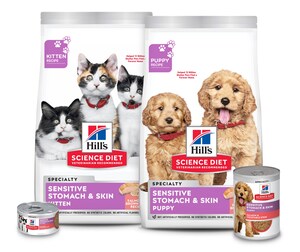New Study Uncovers Challenges For New Pet Parents and Pets in Post-Lockdown Return to Normal and Possible Separation Anxiety
93% of veterinarians feel that puppies and kittens will have a particularly difficult time adjusting, and 92% think it will be tougher for pet parents to handle than they think
TOPEKA, Kan., June 30, 2021 /PRNewswire/ -- Pet adoptions skyrocketed across the nation shortly following the onset of the COVID-19 pandemic. Now, more than one year later, the return to post-lockdown normalcy is slowly happening and leaving new pet parents to face an unwelcome challenge with their 'pandemic pals': the emotions around first-time extended separation. Insights from a new survey from Hill's Pet Nutrition, conducted in partnership with Kelton Global, found that the majority of pet parents who've welcomed a new pet in the last year (69%) are worried about how the pending return to normal and newfound time apart could impact their pet.
NEW PETS IN THE TIME OF COVID
Nearly half of new pet parents (49%) decided to get their pet during the COVID-19 pandemic. The desire for companionship proved to be the driving factor for bringing a new puppy or kitten into homes over the last year. Nearly 2 in 5 (39%) say they did so because they wanted a pet for the human family members, 36% to have a companion, and 34% for emotional support during the COVID-19 pandemic. Not surprisingly, more than one-third (34%) say they wanted a new pet to keep their other pet(s) company.
THERE IS EXCITEMENT AROUND RETURN TO NORMAL BUT "PANDEMIC PAL TIME" WILL CONTINUE
While new pet parents are excited for life to return to normal (79%), they understand the unfortunate trade-off that it brings and will miss spending as much time with their new puppy or kitten. Notably, Millennials (85%) and Gen-Z (84%) are more likely to miss spending so much time with their new puppy or kitten than Baby Boomers (44%).
Interestingly, many veterinarians predict the impending return to normal will make pet parents feel nervous (82%) and sad (63%), and that newly adopted pets will struggle with separation anxiety (87%), changes to routine (86%), and having less attention (82%).
Though, more than 4 in 5 (83%) new pet owners say they think they'll spend more time at home than they used to so they can continue to have quality time with their puppy or kitten.
VETERINARIANS SUGGEST WAYS TO MITIGATE ADJUSTMENT PAINS
While the transition to a new schedule will be tough for both pets and pet parents, there are ways to overcome it. Over 9 in 10 (91%) veterinarians say that trial periods where pet parents leave their pets alone for short amounts of time can make the transition easier. They feel making an effort to keep pets on the same routine (86%) could help, and over half (56%) feel they should keep pets on the same nutrition plan.
Although this will be an adjustment, some positives will certainly come of it as well. Four in five (82%) veterinarians feel that new pets will benefit from learning how to be more independent. In terms of health, just over half (53%) say that another positive will be eating fewer treats throughout the day.
Above all, veterinarians believe new pet parents need to keep an eye on their new pets to make sure they stay happy and healthy. They suggest new pet parents look out for their pets going to the bathroom where they shouldn't (88%), acting out (81%), differences in mood or behavior (79%) and not eating food (53%) while they're going through this adjustment.
"While the pandemic and stay-at-home orders afforded many people the opportunity to open their home and heart to a new pet, the adjustment back to greater normalcy may bring to light unexpected challenges," said S. Dru Forrester, DVM, MS, DACVIM (SAIM) - Director of Global Scientific Affairs, Hill's Pet Nutrition, Inc. "Hill's Pet Nutrition believes in the transformative role nutrition plays in the overall health and well-being of pets, especially in the kitten and puppy life stage. The insights reveal that this transition period may be difficult, so it's important pet parents seek advice from their veterinary healthcare team and ensure their pet maintains a healthy and consistent diet."
To learn more about navigating 'return to normal' separation anxiety for both pets and pet parents, visit here. Additionally, if in need of expert advice, post a comment or DM @HillsPet on Instagram.
About Hill's Pet Nutrition
Founded more than 75 years ago with an unwavering commitment to pet nutrition, Hill's mission is to help enrich and lengthen the special relationships between people and their pets. Hill's is dedicated to pioneering research and groundbreaking nutrition for dogs and cats based on a scientific understanding of their specific needs. Hill's Prescription Diet therapeutic pet foods and Hill's Science Diet wellness pet foods are sold through veterinarians and pet specialty retailers worldwide. For more information about Hill's, our products and our nutritional philosophy, visit us at HillsPet.com, HillsVet.com or Facebook, keywords "Hill's Pet Nutrition."
Survey Methodology
The Hill's Pet Nutrition Survey was conducted by Kelton Global (www.keltonglobal.com), among 1,078 U.S. new dog and cat owners and 275 veterinarians. The study was fielded between April 26, 2021 and April 30, 2021, using an email invitation and an online survey. The margin of error for the U.S. dog and cat owners audience is 3.1 percent; the margin of error for the veterinarian's audience is 6.1 percent. The margin of error for any subgroups within a respective audience will be slightly higher.
About Kelton Global
Kelton Global is a leading global insights firm serving as a partner to more than 100 of the Fortune 500 and thousands of smaller companies and organizations. For more information about Kelton Global please call 1.888.8.KELTON or visit www.keltonglobal.com.
Media Contact:
Karolina Laskawiec
[email protected]
SOURCE Hill's Pet Nutrition

WANT YOUR COMPANY'S NEWS FEATURED ON PRNEWSWIRE.COM?
Newsrooms &
Influencers
Digital Media
Outlets
Journalists
Opted In






Share this article